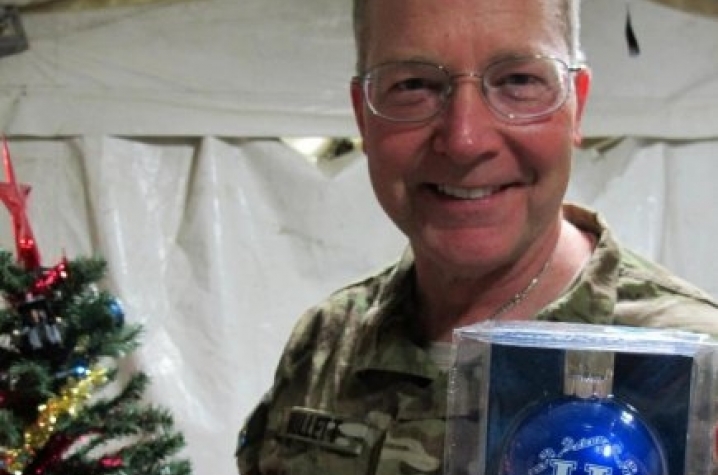UK Surgeon Balances Military, Civilian Career
LEXINGTON, Ky. (March 18, 2013) — It's difficult enough to manage one career, much less two — but University of Kentucky cardiothoracic surgeon Dr. Timothy Mullett is successfully managing a medical career for both UK and the U.S. Army Reserve.
Mullett, a colonel in the U.S. Army Reserve, recently returned to Lexington by way of Afghanistan. The military deployment was his second during the Global War on Terror, with his first to Iraq in 2004.
"I've had opportunities to deploy — and that hasn't been an onerous task for me," Mullett said, noting that open communication with his civilian and military superiors has been key to his achievements. "The Army Reserve has been very accommodating with regard to my civilian career."
Certainly, he understands the impact of being away from his practice.
“Deployment has a big impact on my family and my coworkers," he said. "I couldn’t serve without their sacrifice.”
Over the years, Mullett, 51, said he has been able to focus his efforts where they were needed most. When he came to UK in 1996, it was as a surgeon who focused more on heart issues. However, after arriving, he quickly saw a void that needed to be filled and refocused his work on one of Kentucky's biggest health problems — lung cancer. Two years later, UK formed the Multidisciplinary Lung Cancer Program, naming Mullett as its director.
For the Army Reserve, he focused on advancing his military career by participating in training in events. He also participated in a Homeland Defense mission, being trained and ready to support potential terrorist activity within the United States. He has been prepared for chemical/biologic and nuclear threats. More recently, his attention turned to manning a Forward Surgical Team in a warzone.
Physicians and surgeons in the Army Reserve generally serve one weekend each month and approximately two weeks every year. They may be called upon for deployments as the need arises. However, those deployments are much shorter in duration than those of the average soldier. Mullett's most recent tour to Afghanistan was 90 days, boots on ground.
While he was in Afghanistan, Mullett said he was not as busy as he is in his civilian practice. In a warzone, that's a good problem to have. Mullett said it took "prayerful contemplation," to comprehend the importance of his role.
"What I came to understand is that the soldiers who were going outside the wire took confidence in the fact that we would be here for them if something happened," Mullett said.
Thoracic surgery is one of more than 100 medical specialties represented in the Army. Mullett is one of the few Army surgeons who holds this specific "area of concentration," as the Army refers to officer positions. Mullett says he's "kind of an anomaly" because there are very few thoracic surgeons serving in the Army.
"The Army has allowed me to expand my capacity by learning new skills and teaching others," Mullett said. “The Army is excellent at leadership and organizational structure, it has to be in order to respond the active threats. I’ve been able to bring some of that back to my practice. I also feel that the preparation for patients injured with the complexity of war wounds in an austere environment has made me a better surgeon.”
At UK, his work on lung cancer prevention and treatment is still going strong. In 2011, the New England Journal of Medicine released research from the National Lung Cancer Trial showing that CT scans, which are more sensitive than standard X-rays, are better at detecting lung cancer in its early stages.
Mullett is part of the UK Markey Cancer Center team working with Louisville's Norton Cancer Institute toward developing a program to provide CT scans as a means of early lung cancer screenings. Because lung cancer is often not caught until the cancer is in a late stage — meaning it has spread to other parts of the body — early screenings would be key to greatly improving survival rates. He also directs the Kentucky Clinical Trials Network, a statewide organization of physician practices engaged in Lung Cancer research. Enhancing Lung Cancer Screening in Kentucky is a current priority of that program.
While working in several areas, Mullett credits flexibility in his dual roles, “the ability to shift my priorities between the Army and my practice has allowed me to build each area, as needed, for the past 24 years. When there are demands from my work at UK, the Army career has to wait. When the Army calls, I am able to work with my practice to achieve the best result. It has been blessing to be part of these two great organizations and a privilege to serve.”
MEDIA CONTACT: Allison Perry, (859) 323-2399 or allison.perry@uky.edu






